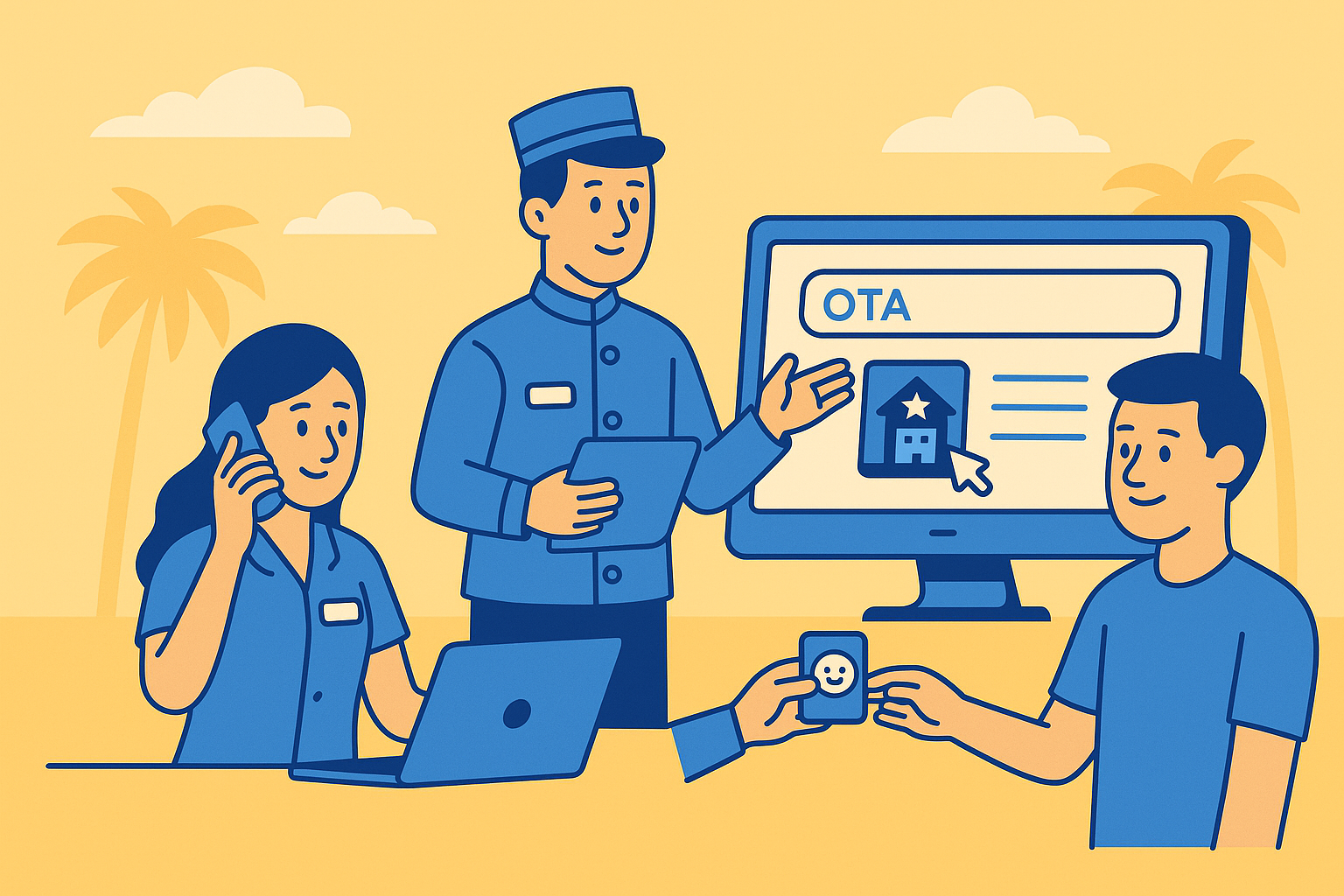How hotels can build a high-performing distribution strategy
Tactics and technology to boost occupancy & RevPAR.
Hotel distribution has evolved significantly over the past 30 years—and it’s accelerating.
AI-powered travel planning tools and generative search are reshaping the way guests discover and book hotels. For hoteliers, diversification of distribution channels is more essential than ever—but it must be strategic. A well-balanced distribution strategy maximizes visibility, reaches broader audiences, and improves profitability.
This article explores the evolution of hotel distribution, the role of technology in simplifying it, and strategies for optimizing both direct and indirect channels.
Understanding the current distribution landscape
Before building and optimizing a distribution strategy, it’s important to understand the role each type of channel plays in today’s ecosystems. Travelers browse and book through a mix of direct and indirect paths, from OTAs and metasearch platforms to corporate travel networks and hotel websites.
Knowing how to strategically leverage each channel helps hoteliers create a more resilient and profitable strategy.
Global Distribution Systems (GDS)
Before the internet, hotels relied on GDS platforms to distribute inventory. Originally designed for airlines, these systems now connect properties with travel agents and corporate bookers who tend to have higher spending power and book independently of seasonality.
Online travel agencies (OTAs)
OTAs revolutionized hotel distribution in the late 1990s, giving travelers access to thousands of properties. Cloudbeds’ 2025 State of Independent Lodging Report found that 61% of bookings were captured by OTAs, a 1.2% increase year-over-year.
While OTAs are crucial for visibility and can help fill rooms during low-demand periods, they come with challenges: high commissions, relinquished control of guest data, and limited branding flexibility. However, they can also serve as top-of-funnel drivers—Expedia Group reports that 61% of travelers who book direct first visited an OTA.
Hotel websites
Hotel websites emerged in the early 2000s as internet adoption grew. Direct booking via hotel websites eliminates commission fees, allows for brand differentiation, and provides ownership of customer data. However, attracting and converting visitors requires ongoing investment in marketing and site development.
Metasearch engines
Platforms like Google Hotel Ads, Tripadvisor, and Trivago aggregate rates across multiple channels to help travelers compare prices. Metasearch advertising typically operates on a cost-per-click model and can be more cost-effective than OTAs, but requires active bid management and competitive pricing to perform well.
The role of technology in simplifying distribution
Managing all of these distribution channels manually is inefficient and prone to error. Three core technologies help hoteliers streamline distribution:
1. Channel manager
A channel manager connects a hotel’s property management system (PMS) with multiple distribution channels, instantly updating availability, pricing, and restrictions. This prevents overbookings and allows for strategic allocation of inventory.
What to look for: Integration with a wide range of OTAs, metasearch engines, and direct booking platforms, with no additional commission fees.
2. Booking engine
A booking engine captures direct reservations on a hotel’s website and is essential for participating in metasearch platforms. It integrates with the PMS for real-time inventory updates and provides secure payment processing.
What to look for: Mobile-friendly design, easy navigation, customization options, and commission-free bookings.
3. Revenue management system (RMS)
An RMS analyzes market data, demand trends, and competitor pricing to recommend optimal rates. AI-powered RMSs can forecast demand and automate pricing updates across all channels.
What to look for: Automated pricing adjustments, competitor rate tracking, forecasting, and seamless integration with other hotel systems.
How these technologies work together
Imagine a major conference is announced in your city. Your RMS detects a spike in demand and recommends raising room rates from $189 to $229. With a single click, your revenue manager approves the update.
The RMS sends the new rate to your channel manager and booking engine, which pushes it out to all OTAs and your website in real time. A guest browsing Google clicks through to your site via Google Hotel Ads, books a room with breakfast included, and completes secure payment.
The channel manager then updates all other channels to reflect the new availability—preventing double bookings and rate discrepancies.
When these tools are seamlessly connected, your hotel can act on demand trends– maximizing revenue while minimizing manual effort.
10 strategies for optimizing channel performance
Rather than trying to be everywhere, focus on the channels that deliver the best results and align with your target guest segments. Here are 10 strategies for effectively doing that.
Indirect channel strategies
1. Optimize OTA presence
OTAs are essential but shouldn't be your entire strategy. Select platforms based on your target market and analyze which channels deliver the best guests and revenue. A mix of global (like Booking.com), regional (like Agoda), and niche (like Mr & Mrs. Smith, for luxury hotels) OTAs help ensure effective distribution.
An important part of optimization has to do with listings:
- Use high-quality photos that showcase your property's best features
- Regularly update descriptions to reflect changes or improvements
- Address negative feedback promptly and professionally
- Use guest insights to enhance property amenities and services
Be sure to regularly analyze performance and update your OTA mix based on seasonality and revenue management requirements.
2. Invest in metasearch advertising
Metasearch is ideal for capturing high-intent traffic, but requires active bid management and performance monitoring. Make sure you adjust ad budgets based on occupancy levels to avoid unnecessary costs when demand is high.
3. Partner with travel management companies and consortia
TMCs (e.g., American Express Global Business Travel, BCD Travel) manage corporate travel and can drive significant weekday business, while consortia (e.g., Signature Travel Network, Travel Leaders Network) represent independent travel agencies that secure negotiated rates for luxury and premium travelers.
To benefit from these partnerships:
- Identify the right consortia for your property
- Invest in proper GDS connectivity
- Have a dedicated corporate sales manager experienced in RFPs (Requests for Proposals)
Direct channel strategies
4. Create a seamless booking experience
OTAs and metasearch engines have raised guest expectations for booking simplicity. Ensure your website includes:
- Mobile-friendly booking engine
- Minimal-click reservation process
- Clear room descriptions with quality images
- Transparent pricing and integrated payments
- Instant confirmations
- Multilingual and multicurrency options
5. Implement best rate guarantees
Encourage direct bookings by pledging to match the lowest publicly available rate—or offer added perks such as complimentary breakfast, spa credits, or room upgrades. Even if the booking ends up having a lower margin, capturing guest data and building loyalty can offset the short-term revenue trade-off.
6. Claim & optimize your Google Business Profile
Given that Google is often a traveler’s first touchpoint and that Google Business Profile is completely free, you would be leaving money on the table by ignoring it.
A well-maintained Google Business Profile:
- Enhances visibility in local search results
- Enables direct bookings via Google Hotel Search
- Showcases guest reviews and ratings, boosting credibility
- Prevents inaccurate third-party information from misrepresenting your property
7. Invest in reputation management
Higher ratings can increase revenue. Research from Cornell University found that a 1-point increase in a 5-point review scale allows hotels to raise rates by 11.2% without losing occupancy.
Here are key strategies for managing your reputation:
- Actively encourage guest reviews
- Use reputation management software to monitor and respond across platforms
- Address feedback constructively
- Maintain strong ratings to improve visibility in AI-driven search engines
8. Use retargeting ads to reengage potential guests
Travelers often visit multiple sites before booking. Retargeting ads allow your hotel to:
- Recapture potential guests who previously viewed your property
- Increase conversion rates compared to cold audiences
- Remind undecided travelers of their interest in your hotel
9. Leverage chatbots to facilitate the booking process
AI-powered chatbots handle guest inquiries 24/7 in multiple languages, assist with bookings, suggest upgrades, and upsell amenities.
10. Use AI-powered intelligence to align revenue, marketing, and distribution
AI-powered intelligence refers to advanced analytics platforms that process large volumes of data from multiple hotel systems and sources–applying machine learning to reveal insights that are otherwise difficult to detect.
These systems not only show what happened but why it happened by identifying cause-and-effect relationships.
With AI analytics you can:
- Uncover true cause-effect relationships between price changes and demand
- Determine if reservation increases after marketing campaigns are due to the campaign itself or just seasonal trends
- Identify which promotions to invest in and at what time and segment
This shared intelligence allows all departments to make decisions based on the same reliable data to optimize revenue.
The future of distribution
Hotel distribution continues to evolve, requiring properties to test different channels and adapt strategies accordingly. There is a shift happening from the passive "distribution presence" approach of simply listing on a few OTAs, to a "distribution intelligence" approach of actively managing a diverse channel mix.
At the same time, AI-powered search tools are changing how travelers discover hotels—pulling in pricing, reviews, and brand data from across the web. This means your visibility, guest reputation, and direct booking readiness are more important than ever.
To stay competitive, hoteliers must:
- Continuously test and refine their channel mix.
- Leverage automation to improve efficiency.
- Use AI insights to connect the dots across revenue, marketing, and guest behavior.
Those hotels that combine strategic channel management with real-time data and automation will see the best results.
About Cloudbeds:
Cloudbeds is the leading platform redefining the concept of PMS for the hospitality industry, serving tens of thousands of properties in more than 150 countries worldwide. Built from the ground up to be masterfully unified and scalable, the award-winning Cloudbeds Platform brings together built-in and integrated solutions that modernize hotel operations, distribution, guest experience, and data & analytics.
Time is one the greatest asset and one of the things that [Akia] has helped us out as a property tremendously.
Lana C.
Content Marketing Manager at Cloudbeds
Time is one the greatest asset and one of the things that [Akia] has helped us out as a property tremendously.
Ethan Fishbane
Director of The Front Office, Prince Waikiki
See Akia in action!
Schedule a demo today and learn how our hospitality platform can transform your operations and elevate your guest experience.

Schedule of events and useful links
Never miss a beat with our comprehensive schedule of events and collection of useful links.

Schedule of events and useful links
Never miss a beat with our comprehensive schedule of events and collection of useful links.


Large family groups seek all-inclusive offers. Akia's Mini Apps and booklets are a great way to personalize guest journeys. To help build itineraries and create more meaningful experiences, businesses utilize Mini Apps to share what's new and upcoming and list exciting activities and events.











